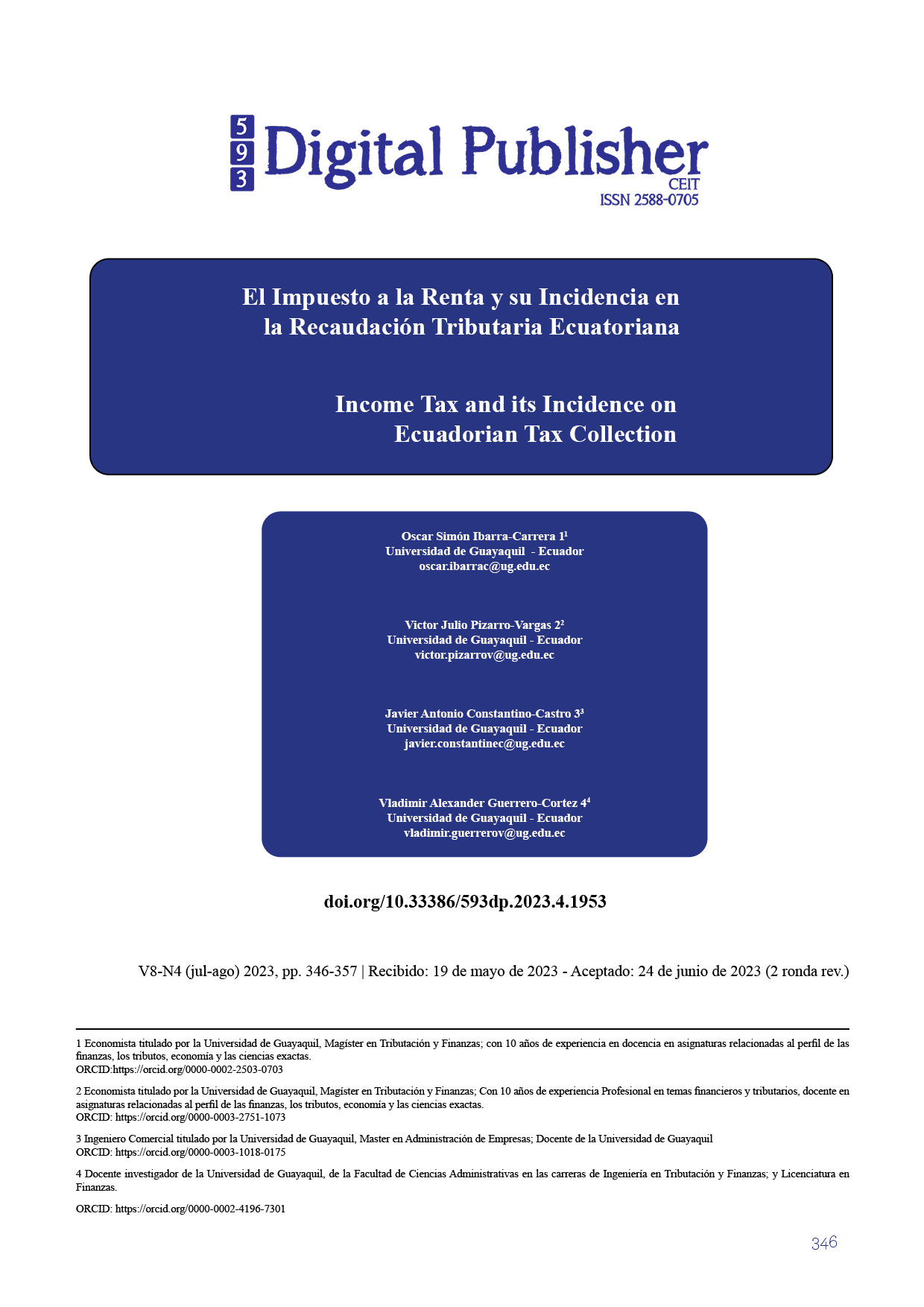Income tax and its incidence on ecuadorian tax collection
Main Article Content
Abstract
The research focused on carrying out a quantitative and qualitative analysis of the effect of the Income Tax on the tax collection of Ecuador in the years 2016 to 2022, determining that it is one of the most efficient taxes in the generation of tax revenue for the country, as it is a tribute that directly taxes the contributory capacity of the taxpayer. A finite population was used for data selection; an analytical method that allowed to identify and select the quantitative and qualitative variables. It was shown that the income from the collection of Income Tax maintained a growing trend in each period and that it represented 32.18% equivalent to 31,337 million dollars in relation to the total tax collection. Comparisons were established between the data selected by the variables: dependent and independent and it was determined, from the Income Tax in the tax collection of Ecuador.
Downloads
Article Details

This work is licensed under a Creative Commons Attribution-NonCommercial-ShareAlike 4.0 International License.
1. Derechos de autor
Las obras que se publican en 593 Digital Publisher CEIT están sujetas a los siguientes términos:
1.1. 593 Digital Publisher CEIT, conserva los derechos patrimoniales (copyright) de las obras publicadas, favorece y permite la reutilización de las mismas bajo la licencia Licencia Creative Commons 4.0 de Reconocimiento-NoComercial-CompartirIgual 4.0, por lo cual se pueden copiar, usar, difundir, transmitir y exponer públicamente, siempre que:
1.1.a. Se cite la autoría y fuente original de su publicación (revista, editorial, URL).
1.1.b. No se usen para fines comerciales u onerosos.
1.1.c. Se mencione la existencia y especificaciones de esta licencia de uso.
References
Altamirano Silva, Y. / T. G. J. (2023). El impuesto a la renta y su incidencia sobre la rentabilidad en la Agencia de Viajes y Turismo Interlineas S.AC - periodo 2014. https://explore.openaire.eu/search/publication?articleId=od______9504::1a7a1ba914ca56061fb70e34 6e0da4bf
Asamblea Nacional del Ecuador. (2023). LEY DE REGIMEN TRIBUTARIO INTERNO, LRTI. https://www.ces.gob.ec/lotaip/2018/Agosto/Anexos-literal-a2/LEY%20DE%20REGIMEN%20TRIBUTARIO%20INTERNO,%20LRTI.pdf
Barba Blandon, C. M., & Chavarria Morazan, J. M. (2009). Aplicación y contabilizacion del impuesto sobre la renta (I.R) en las financieras coficsa y credicom y las Cooperativas de Ahorro y Crédito Integral y Union R.L. del Departamento de Matagalpa correspondiente al periodo fiscal del 1ro de Julio del 2007 al 30 de Junio del 2008.
Bautista, J. A. (2011). Equidad o inequidad tributaria: la distribución del impuesto a la renta en Colombia: 1990-2002. Cuadernos de Contabilidad, 12(30), 45-76. http://www.scielo.org.co/scielo.php?script=sci_arttext&pid=S0123-14722011000100003&lng=en&nrm=iso&tlng=es
Castañeda Rodríguez, V. M. (2016). La globalización y sus relaciones con la tributación, una constatación para América Latina y la OCDE. Cuadernos de Economía, 35(68), 379-406. https://doi.org/10.15446/cuad.econ.v35n68.52801
Crespo García, M. K., & Romero Lalangui, M. A. (2023). Fomento de la cultura tributaria a través de Centros de Asesoría Fiscal. TECHNO REVIEW. International Technology, Science and Society Review /Revista Internacional de Tecnología, Ciencia y Sociedad, 14(3), 1-15. https://doi.org/10.37467/revtechno.v14.4834
Especial, E., Simón Ibarra-Carrera, O., Isabel Aguayo-Delgado, M., Antonio Constantino-Castro, J., & Julio Pizarro-Vargas, V. (2023). Los tributos del Ecuador y su participación en el presupuesto general del estado. 593 Digital Publisher CEIT, 8(2-1), 69-79. https://doi.org/10.33386/593dp.2023.2-1.1723
Estévez, A. M., & Esper, S. C. (2009). CIUDADANÍA FISCAL Y NUEVAS FORMAS DE RELACIÓN ENTRE CONTRIBUYENTES Y ADMINISTRACIÓN TRIBUTARIA. Contacto: almestevez@afip.gov.ar. SaberEs. No, 1, 63-74.
Fidias. (2012). El Proyecto de Investigación Introducción a la metodología científica (Editorial Episteme).
Gómez Sabaíni, J. C., & Morán, D. (2016). La situación tributaria en América Latina: raíces y hechos estilizados. Cuadernos de Economía, 35(SPE67), 1-37. https://doi.org/10.15446/CUAD.ECON.V35N67.52417
González-de Álvarez, C. (2019). The tax of the small taxpayer: A decade of the formalization. Población y Desarrollo, 25(48), 49-56. https://doi.org/10.18004/PDFCE/2076-054X/2019.025(48)049-056
H. Congreso Nacional. (2018). CODIGO TRIBUTARIO. www.lexis.com.ec
Hernández, R., Fernández, C., & Baptista, M. (2014). Metodología de la Investigación: Vol. Sexta edición (M. Rocha, Ed.; McGRAW-HILL).
Herrera, C., & Parolo, M. P. (2012). Las dos caras de la fiscalidad: Estado y contribuyentes. Tucumán, 1853-1870. Boletín del Instituto de Historia Argentina y Americana Dr. Emilio Ravignani, 34, 47-76. http://www.scielo.org.ar/scielo.php?script=sci_arttext&pid=S0524-97672012000100002&lng=es&nrm=iso&tlng=es
Patricia Alaña Castillo, T., Jahaira Gonzaga Añazco, S., & Marisol Yánez Sarmiento, M. (s. f.). A MICROEMPRESARIOS MEDIANTE LA CREACIÓN DEL CENTRO DE ASESORÍA CASO: UMET SEDE MACHALA GESTIÓN TRIBUTARIA. Recuperado 9 de mayo de 2023, de http://rus.ucf.edu.cu/index.php/rus
Ramírez-álvarez, J., & Carrillo-Maldonado, P. (2020). Indicador de eficiencia recaudatoria del impuesto al valor agregado y del impuesto a la renta del Ecuador. Cepal Review, 2020(131), 77-94.
Rodríguez, J. A., & Mahecha, J. (2017). The tax burden on labor and capital income in Colombia: The case of the income tax and the VAT | La carga tributaria sobre los ingresos laborales y de capital en Colombia: El caso del impuesto sobre la renta y el IVA. Cuadernos de Economia (Colombia), 36(72), 99-138. https://doi.org/10.15446/cuad.econ.v36n72.65877
Servicio de Rentas Internas. (2012). Guía para contribuyentes Impuesto a la Renta Concepto. https://www.sri.gob.ec/impuesto-renta
Valdez Arrúa, N. M., Martínez Díaz, P., Valdez Arrúa, N. M., & Martínez Díaz, P. (2018). La cultura tributaria como mecanismo facilitador de la formalización de los puestos de ventas en el mercado municipal de San Lorenzo. Población y Desarrollo , 24(46), 93-98. https://doi.org/10.18004/PDFCE/2076-054X/2018.024(46).093-098
Andrade, M., & Cevallos, K. (2020). Vista de Cultura tributaria en el Ecuador y la sostenibilidad fiscal. https://doi.org/10.35290/re.v1n1.2020.290





